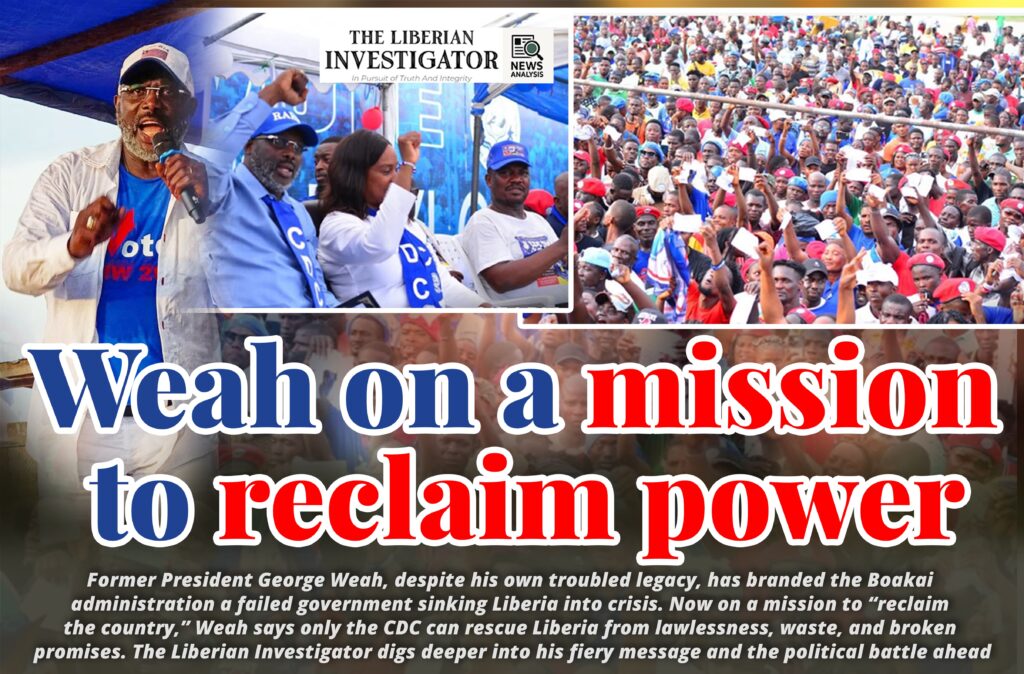
MONROVIA — Former President George Manneh Weah has declared war on the Boakai administration — politically, at least. In a fiery return to the national stage, Weah is not just calling for a CDC comeback; he’s painting President Joseph Boakai’s government as a national disaster in urgent need of correction — and positioning himself as the man to fix it.
This was not the George Weah of concession speeches and peaceful transitions. This was a political general marshalling his forces for a long campaign.
From the moment he stepped onto the platform at the CDC’s headquarters in Congo Town on Saturday, Weah’s message was unambiguous: the Boakai-led Unity Party government has failed — and only the CDC has the grassroots strength and experience to “reclaim” the country.
A Calculated Strategy of Political Redemption — Or a Rethinking of Retirement?
What makes Weah’s latest political offensive even more striking is its stark contrast to his earlier hints of retirement from active politics.
Back in January 2024 — just weeks after conceding defeat in the presidential runoff — Weah, speaking at his Forkey Klon Jlateh Fellowship Church on the RIA Highway, surprised many when he hinted that he would not be contesting the presidency again in 2029.
“Right now I’m 57, and our retirement age is 65. Six years from now, I will be 63, and I cannot work for two years,” Weah said then, adding: “The best thing we can do now is to promote peace and prosperity for this country, and nobody is going to drag me into politics until I reach 90 years.”
For a leader whose popularity was built on humility and sportsmanship, the comments struck a chord — signaling, at least at the time, a graceful exit strategy focused on legacy, family, and mentorship.
Yet, his latest political maneuvering suggests either a change of heart — or a well-calculated ambiguity designed to keep political opponents guessing while rallying his base.
CDC’s Ground Game: Loyalty Over Policy
Weah’s speech struck a nerve because it tapped into a sentiment that the Boakai government has been struggling to shake — that its “Rescue Mission” slogan is fast unraveling under the weight of political controversies, legislative paralysis, and rising public frustration.
With sharp rhetoric, Weah listed what he framed as the administration’s sins: executive overreach, lawlessness in the Legislature, abuse of citizens’ rights by security forces, and wasteful spending. His words were a calculated attempt to not just criticize but to set the narrative — that the CDC handed over power peacefully, only to watch the country spiral backward.
But this is not just opposition politics for the sake of noise. It is a crafted strategy of political redemption — a comeback play by a former president whose own tenure was marred by governance failures, but who still commands the loyalty of a massive political base.
Central to Weah’s message was a return to grassroots politics — symbolized by the party’s national dues payment campaign. In Liberia’s political culture, this is not merely a fundraising exercise — it is a loyalty test and a machinery-building mechanism.
“Paying dues is not just about money. It symbolizes commitment, loyalty, and a shared hope for a better Liberia,” Weah told thousands of chanting supporters.
This is the CDC’s strongest weapon — a disciplined, mobilized base that sees itself not just as supporters, but as a movement with unfinished business.
Embattled House Speaker J. Fonati Koffa and Senator Nathaniel McGill, both key figures in CDC’s post-election structure, echoed Weah’s rallying cry, pledging unwavering loyalty until the party retakes power.
The presence of Montserrado County District #10 Representative Yekeh Kolubah — a once fierce critic of Weah — was another political spectacle, signaling either CDC’s widening tent or Kolubah’s own shifting calculations.
Boakai’s Growing Vulnerabilities
The Weah offensive is landing because the Boakai government is vulnerable — not only because of internal wrangling or administrative inertia — but because of the high expectations it created during its campaign.
President Boakai inherited a fragile economy, struggling institutions, and a tired political class. But it is the slow pace of reform, coupled with allegations of selective justice, governance blunders, and perceived elite arrogance, that is giving the CDC oxygen.
For ordinary Liberians — still grappling with poverty, unemployment, and insecurity — political loyalty is fluid. If Weah can present himself not just as a returning strongman but as a humbled leader willing to correct past mistakes, his narrative could gain traction beyond his core base.








Discussion about this post